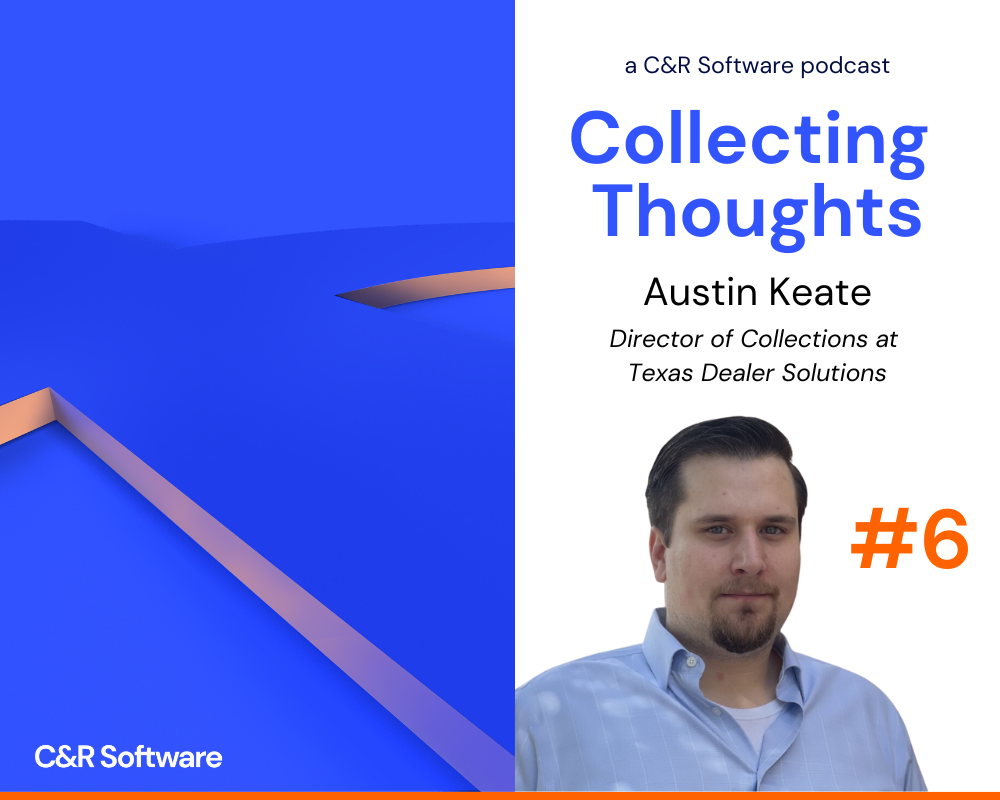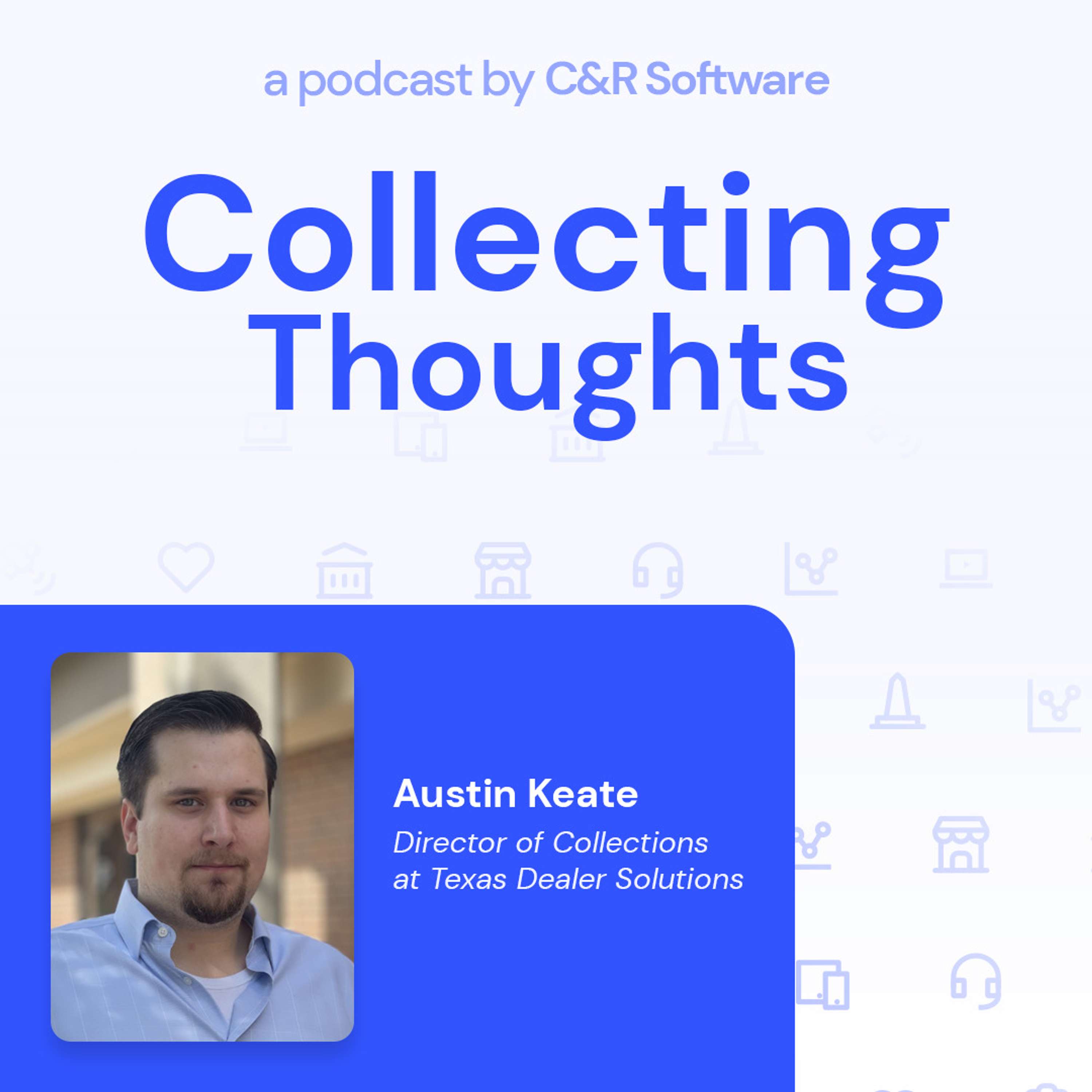Collecting Thoughts is C&R Software’s new podcast, presenting conversations with subject matter experts and insiders throughout the finance, software, and collections industries.
This week, our host, Christina, spoke with Austin Keate, the Director of Collections at Texas Dealer Solutions. TDS is a prominent finance company that assists BHPH (Buy Here, Pay Here) dealerships raise capital and find short- and long-term cash flow solutions.
The two spoke about Austin’s path to the collections industry, technology, relationship building, and his advice on leading teams.
Guest Profile
Name: Austin Keate
Profession: Director of Collections, Texas Dealer Solutions
Austin started his career in oil, gas, and construction, and his career took off when he assumed the role of General Manager at a car dealership’s in-house financing department. Leading a team of collectors, salesmen, shop, and support staff, he gained experience and knowledge before leaving to become a founding partner of Texas Dealer Solutions.
Austin has created, implemented, and refined processes not only in the collections department but also in the sales and acquisitions departments.
Find Austin on LinkedIn.
Episode’s Key Points
Seizing the Opportunity to Start New Ventures
Austin explains why he decided to jump from General Manager at an in-house financing department to co-founding his auto collections company and the challenges he’s faced in doing so.
As Austin explained, going from dealership financing to capital solutions for dealerships was a peripheral move, so it was a natural segue. Identifying the need for dealerships to be able to sell their inventory financing, they went from a small team to over 35 people.
“One of the biggest differences that I personally wasn’t expecting is, it is very easy for someone to be upset with you when you haven’t met them… [when you’re] selling them a car, they really like you a whole lot more.
Whenever we purchase these loans, we have recourse on the account, meaning if the contract does not perform, we can reassign that account back to the dealer. Oftentimes, they’re unhappy to pay those. So it puts us in the position of having to collect the collectors, which was definitely a new challenge.”
Balancing Technology and Analog Relationship-Building
An essential part of the collections industry is leveraging current technology—but so too is old-fashioned human interaction and relationship-building. Christina asked Austin how he’s managed to walk the line and avoid relying too heavily on either.
According to Austin, a successful operation needs its people to remain aware of the drawbacks of particular technology used in collections. Presenting clients with a mix of both face-to-face discussion and self-service technological options offers the most significant benefit in the long run.
“Anytime you provide self-service options and push people towards those self-service options, you’re risking losing that interpersonal contact. And as we try to integrate more self-service options, that’s something that we continue to try to hit that perfect balance of.
If, prior to an account becoming delinquent, I have a conversation with you about the expectations, then whenever your account becomes delinquent, it’s going to be a different conversation than if I only talk to you at the first point of delinquency and whether or not they
ever become delinquent is entirely up to them, but by hand introducing them to the self-service options, you increase the chances that they’ll utilize those.”
Managing Teams Through Direct Feedback
Austin spoke about his strategies for managing teams and ensuring his collectors feel ownership of their accounts and can receive fair and direct feedback.
For him, it’s about keeping teams small and having one collector deal with an account through its entire lifecycle rather than passing it through multiple collectors or teams.
“The second your account becomes delinquent, you have one collector working on it, and you will deal with that one collector unless there’s an issue until the end of that loan. I think that helps give individuals ownership over the accounts.
Hearing conflicting messages is the best way to raise somebody’s heart rate. If you have one person that you could call who always resolved your issue—be it a business-to-business customer or a consumer, how much better would that relationship be? So much better.”
Learn more about Austin
To discover more topics on finance, software, and the collections industry topics from insiders and experts like Austin, visit the C&R Software blog.
Stay tuned for future episodes of Collecting Thoughts, where host Christina dives deep into more interviews with leaders from across the debt recovery and software world.





-Jan-20-2026-02-48-49-6447-PM.png?width=352&name=operationalize%20AI%20(15)-Jan-20-2026-02-48-49-6447-PM.png)

-Jan-28-2026-02-16-48-0429-PM.png?width=352&name=operationalize%20AI%20(14)-Jan-28-2026-02-16-48-0429-PM.png)